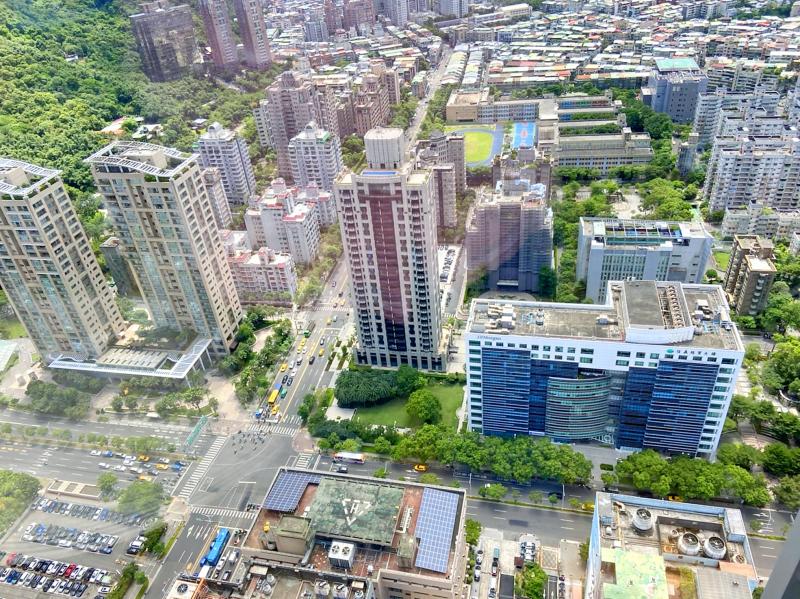The presale and new housing market last quarter held steady from three months earlier by measure of projects for sale, showing a fractional 0.9 percent growth to NT$328 billion (US$11.13 billion), a Cathay Real Estate Development Co (國泰建設) survey showed on Wednesday.
Sales rates slowed somewhat, but selling prices rose nationwide as developers and builders passed rising construction costs on to buyers.
This segment of the property market continued to perform well, judging by housing prices, the survey showed.

Photo: Hsu Yi-ping, Taipei Times
Developers and builders launched 231 projects offering 20,559 units that could generate NT$328 billion in sales, representing a 13.5 percent increase compared with a year earlier, it said.
The increase in revenue came even though the number of projects and units declined 6.1 percent and 2 percent from their respective levels three months earlier, it said.
That meant the supply side refrained from active project launches, but raised prices to reflect spikes in labor and building material costs, it said.
Some developers pushed back their release schedules after government agencies introduced a spate of unfavorable measures to cool the market, it said.
The Ministry of the Interior is sponsoring a bill to impose stiff fines on dishonest marketing practices, and the central bank is suggesting further credit controls after hiking interest rates by 0.25 percentage points in March.
Potential transaction prices gained 13.66 percent to NT$432,500 per ping (3.3m2) nationwide, while leeway for price concessions was virtually flat at 7.71 percent, it said.
The 30-day sales rate was relatively stable at 15.2 percent, down 1.86 percentage points from the previously quarter, it said.
Price increases are most evident in Hsinchu County at 19.2 percent, followed by Taoyuan at 18.45 percent, and Kaohsiung at 16.37 percent, it said.
Prices for presale housing projects in Taichung and Tainan both rose 11 percent, while advancing 8.6 percent in Taipei and 8.52 percent in New Taipei City.
Average selling prices in Taipei reached NT$1.06 million per ping, a mark previously limited to popular locations, it said, adding that uncertainty is gathering pace this quarter due to heightening economic downside risks.

US sports leagues rushed to get in on the multi-billion US dollar bonanza of legalized betting, but the arrest of an National Basketball Association (NBA) coach and player in two sprawling US federal investigations show the potential cost of partnering with the gambling industry. Portland Trail Blazers coach Chauncey Billups, a former Detroit Pistons star and an NBA Hall of Famer, was arrested for his alleged role in rigged illegal poker games that prosecutors say were tied to Mafia crime families. Miami Heat guard Terry Rozier was charged with manipulating his play for the benefit of bettors and former NBA player and

The DBS Foundation yesterday announced the launch of two flagship programs, “Silver Motion” and “Happier Caregiver, Healthier Seniors,” in partnership with CCILU Ltd, Hondao Senior Citizens’ Welfare Foundation and the Garden of Hope Foundation to help Taiwan face the challenges of a rapidly aging population. The foundation said it would invest S$4.91 million (US$3.8 million) over three years to foster inclusion and resilience in an aging society. “Aging may bring challenges, but it also brings opportunities. With many Asian markets rapidly becoming super-aged, the DBS Foundation is working with a regional ecosystem of like-minded partners across the private, public and people sectors

BREAKTHROUGH TECH: Powertech expects its fan-out PLP system to become mainstream, saying it can offer three-times greater production throughput Chip packaging service provider Powertech Technology Inc (力成科技) plans to more than double its capital expenditures next year to more than NT$40 billion (US$1.31 billion) as demand for its new panel-level packaging (PLP) technology, primarily used in chips for artificial intelligence (AI) applications, has greatly exceeded what it can supply. A significant portion of the budget, about US$1 billion, would be earmarked for fan-out PLP technology, Powertech told investors yesterday. Its heavy investment in fan-out PLP technology over the past 10 years is expected to bear fruit in 2027 after the technology enters volume production, it said, adding that the tech would

YEAR-END BOOST: The holiday shopping season in the US and Europe, combined with rising demand for AI applications, is expected to drive exports to a new high, the NDC said Taiwan’s business climate monitor improved last month, transitioning from steady growth for the first time in five months, as robust global demand for artificial intelligence (AI) products and new iPhone shipments boosted exports and corporate sales, the National Development Council (NDC) said yesterday. The council uses a five-color system to measure the nation’s economic state, with “green” indicating steady growth, “red” suggesting a boom and “blue” reflecting a recession. “Yellow-red” and “yellow-blue” suggest a transition to a stronger or weaker condition. The total score of the monitor’s composite index rose to 35 points from a revised 31 in August, ending a four-month